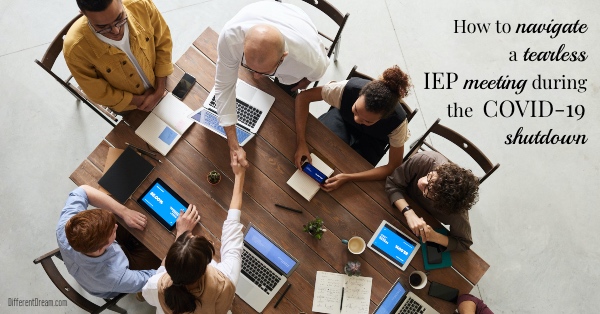Navigating an IEP Meeting During the Coronavirus Shutdown

Navigating an IEP meeting during the coronavirus shutdown can be tricky, but it’s not impossible. Guest blogger Jessica Temple offers tips parents can use to be on top of their game and remain tearless now and after the shut down ends.
We recently had an emergency IEP meeting, the second one we’ve attended, for our 4-year-old son who has autism. My husband and I were woefully unprepared for the first meeting. We didn’t know how to prepare, what our rights were, or how to work with the system.
This second meeting came almost 12 months afterwards. I have learned a lot during that year about what goes into IEPs, what to say, what not to say, what rights parents and our special needs children have, and how the meetings are run. I am here to share tips about navigating an IEP meeting during the coronavirus shutdown without shedding tears. The goal is always to get the appropriate IEP for your child. (Bonus tip: Never say best or most, just appropriate.)
Tip #1: Find Advocates
Find someone who has a great deal of knowledge, and ask, ask, ask! This can be as informal as a friend who has gone through many IEP meetings, contacting the Parent Training and Information Center through your state, or hiring a formal IEP or disability rights advocate. I used the free services through my state. They were kind enough to offer me 3 people to talk to. These individuals provided documents about our rights, important buzzwords, as well as IEP document phrasing and what to say if the team denied an accommodation we deemed necessary. They helped me to create and word several goals and services that would be the most useful to my son at his present age and stage. They also provided snippets of case law should our rights be violated.
Tip #2: Attend Workshops
Many states have free workshops through their school systems. Different special needs societies also have free workshops dedicated to children’s education, special needs, and IEPs. We attended a workshop a before our IEP meeting. They went through every page of a blank IEP and discussed what services are appropriate when, how to ask for what’s needed, how to have it phrased in the actual document, and what to do if the IEP team pushes back. On top of that, they said our local school system has a free,special needs lending library. They also brought a large selection of books specific to IEPs.
Tip #3: Read Books about IEPs
I flipped through many of the books at the workshop, and selected the four that I found most useful and relevant. They discussed each component of the IEP, the case law related to the IEP, and step-by-step ways to solve problems. The books had templates for letters to write to the IEP team, examples of questions to ask, instructions for writing effective goals, and strategies to resolve disputes. The four books I recommend are:
The Art of Advocacy by Charmaine Thaner, M.A.
Negotiating the Special Education Maze by Winifred Anderson, Stephen Chitwood, Deirdre Hayden, and Cherie Takemoto
The Complete IEP Guide by Lawrence M. Siegel
From Emotions to Advocacy by Pam and Pete Wright
Tip #4 Attend a Local Support Group
We attended several local autism support group meetings. The individuals who attend these meetings have often been in the special needs world for a long time and have experience with IEPs. They provided tons of handouts, resources, and had another lending library! They were supportive, understanding, and tried to answer my questions.
Tip #5: Access Online Resources
I have used the internet to find local support groups and Facebook groups. I found local Facebook groups to most beneficial as other ones were either too general or didn’t provide helpful enough information. Websites specific to a specific disability explained what should or could be included in the IEP for that disability.
These websites have copious information related to laws and IEPs:
Wrights Law
A Day in Our Shoes
The Wrightslaw Way
National Disability Rights Network
Education Law Center
Tip #6: Listen to Podcasts
I love podcasts that provide useful help with IEPs, important perspectives, and information on disability rights. Here are my favorites:
Don’t IEP Alone by Lisa Lightner
LOMAH Special Needs Podcast
Thriving in The Midst of Chaos with Jessica and Lewis Temple
Tip #7: Coronavirus and IEPs
Coronavirus has thrown a monkey wrench into IEPs. These resources may be very helpful for you to learn more about how this may affect your child, what to do in this unprecedented time, and what your rights are:
United States Department of Education California Department of Education American Bar Association
National Center for Special Education in Charter Schools
Parent’s Place of Maryland
Tip #8: Coronavirus and Homeschooling
The following resources may be very helpful to keep your child’s IEP and services on track until schools are in session again and help you with homeschooling:
A Day In Our Shoes Homeschooling
Resources School Closure Toolkit
Easter Seal
IEP meetings are stressful. They are a lot of work, and there is a lot to know. However, if you utilize these resources and arm yourself with knowledge, you will be tearless, successful navigating an IEP meeting during the coronavirus shutdown, and satisfied with the IEP you and your child’s team put together.
Do you like what you see at DifferentDream.com? You can receive more great content by subscribing to the monthly Different Dream newsletter and signing up for the daily RSS feed delivered to your email inbox. You can sign up for the first in the pop up box and the second at the bottom of this page.

By Jessica Temple
Jessica Temple, PsyD, ABPP-CN, is a board-certified adult clinical neuropsychologist. She has two children who have special needs. She and her husband, Lewis, host a podcast called Thriving in The Midst of Chaos, where they talk about all aspects of special needs including getting a diagnosis and treatment, self-care, relationships, transitioning to adulthood, school, and finances. They created Thriving in The Midst of Chaos to offer support to others in the special needs world as well as to provide an easy way to find the most useful resources. They aim to share helpful resources with others, advocate for improvement, change in the special needs world, and offer a different perspective on parenting. To find out more about how Jessica’s work can help you, contact her at fubarpod@gmail.com or @midstofchaospod on all social media platforms.
Related Posts
Managing Mixed Emotions When Our Kids with Disabilities Go Back to School
Guest blogger Kristin Faith Evans offers tips for managing mixed emotions when our kids with disabilities go back to school.
How Much Is Too Much to Tell Teachers about my Child’s Disability?
Guest blogger and teacher Maggi Gale asks, “How much is too much to tell teachers about my child’s disability?”
Setting Goals for Adult Children with Disabilities Matters
Guest blogger Sandy Ramsey-Trayvick explains why setting goals for adult children with disabilities matters.






0 Comments